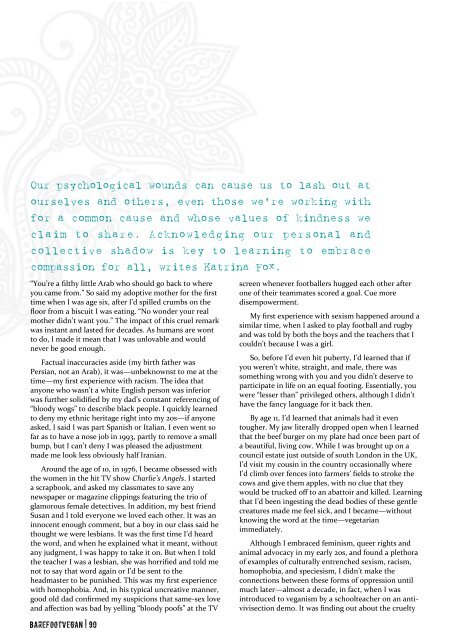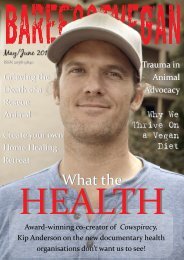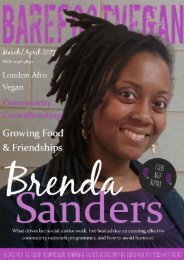Barefoot Vegan Mag Jan_Feb 2017
Create successful ePaper yourself
Turn your PDF publications into a flip-book with our unique Google optimized e-Paper software.
Our psychological wounds can cause us to lash out at<br />
ourselves and others, even those we’re working with<br />
for a common cause and whose values of kindness we<br />
claim to share. Acknowledging our personal and<br />
collective shadow is key to learning to embrace<br />
compassion for all, writes Katrina Fox.<br />
“You’re a filthy little Arab who should go back to where<br />
you came from.” So said my adoptive mother for the first<br />
time when I was age six, after I’d spilled crumbs on the<br />
floor from a biscuit I was eating. “No wonder your real<br />
mother didn’t want you.” The impact of this cruel remark<br />
was instant and lasted for decades. As humans are wont<br />
to do, I made it mean that I was unlovable and would<br />
never be good enough.<br />
Factual inaccuracies aside (my birth father was<br />
Persian, not an Arab), it was—unbeknownst to me at the<br />
time—my first experience with racism. The idea that<br />
anyone who wasn’t a white English person was inferior<br />
was further solidified by my dad’s constant referencing of<br />
“bloody wogs” to describe black people. I quickly learned<br />
to deny my ethnic heritage right into my 20s—if anyone<br />
asked, I said I was part Spanish or Italian. I even went so<br />
far as to have a nose job in 1993, partly to remove a small<br />
bump, but I can’t deny I was pleased the adjustment<br />
made me look less obviously half Iranian.<br />
Around the age of 10, in 1976, I became obsessed with<br />
the women in the hit TV show Charlie’s Angels. I started<br />
a scrapbook, and asked my classmates to save any<br />
newspaper or magazine clippings featuring the trio of<br />
glamorous female detectives. In addition, my best friend<br />
Susan and I told everyone we loved each other. It was an<br />
innocent enough comment, but a boy in our class said he<br />
thought we were lesbians. It was the first time I’d heard<br />
the word, and when he explained what it meant, without<br />
any judgment, I was happy to take it on. But when I told<br />
the teacher I was a lesbian, she was horrified and told me<br />
not to say that word again or I’d be sent to the<br />
headmaster to be punished. This was my first experience<br />
with homophobia. And, in his typical uncreative manner,<br />
good old dad confirmed my suspicions that same-sex love<br />
and affection was bad by yelling “bloody poofs” at the TV<br />
screen whenever footballers hugged each other after<br />
one of their teammates scored a goal. Cue more<br />
disempowerment.<br />
My first experience with sexism happened around a<br />
similar time, when I asked to play football and rugby<br />
and was told by both the boys and the teachers that I<br />
couldn’t because I was a girl.<br />
So, before I’d even hit puberty, I’d learned that if<br />
you weren’t white, straight, and male, there was<br />
something wrong with you and you didn’t deserve to<br />
participate in life on an equal footing. Essentially, you<br />
were “lesser than” privileged others, although I didn’t<br />
have the fancy language for it back then.<br />
By age 11, I’d learned that animals had it even<br />
tougher. My jaw literally dropped open when I learned<br />
that the beef burger on my plate had once been part of<br />
a beautiful, living cow. While I was brought up on a<br />
council estate just outside of south London in the UK,<br />
I’d visit my cousin in the country occasionally where<br />
I’d climb over fences into farmers’ fields to stroke the<br />
cows and give them apples, with no clue that they<br />
would be trucked off to an abattoir and killed. Learning<br />
that I’d been ingesting the dead bodies of these gentle<br />
creatures made me feel sick, and I became—without<br />
knowing the word at the time—vegetarian<br />
immediately.<br />
Although I embraced feminism, queer rights and<br />
animal advocacy in my early 20s, and found a plethora<br />
of examples of culturally entrenched sexism, racism,<br />
homophobia, and speciesism, I didn’t make the<br />
connections between these forms of oppression until<br />
much later—almost a decade, in fact, when I was<br />
introduced to veganism by a schoolteacher on an antivivisection<br />
demo. It was finding out about the cruelty<br />
BAREFOOT<strong>Vegan</strong> | 90





